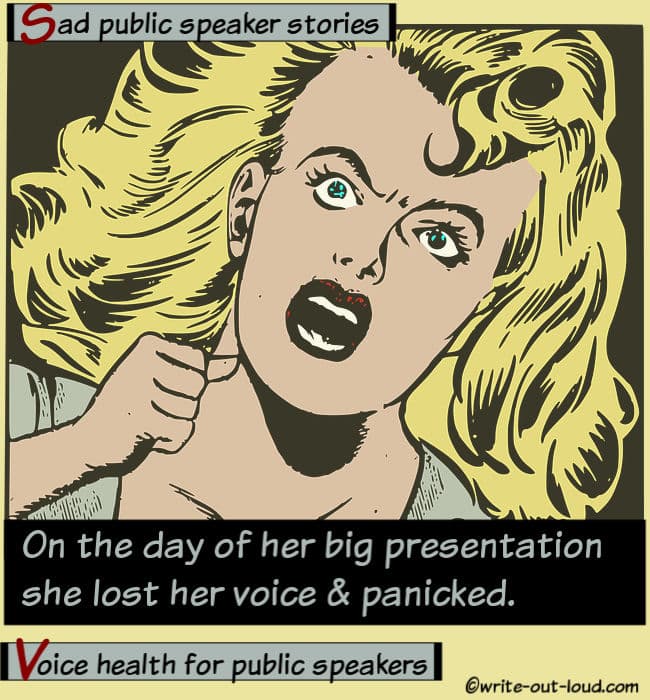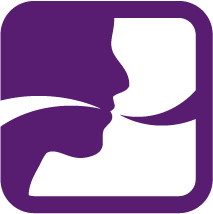- HOME ›
- Speech delivery ›
- Voice health
Voice health for public speakers
6 voice health maintenance dos and don'ts
By: Susan Dugdale
Most of us don't consider voice health until we lose it. We open our mouths to speak and 99% of the time we do so with ease.

However for a large and growing number of people 'speaking easy' is something they no longer take for-granted.
When you speak for work voice health matters
If you're a teacher, a call center worker, a coach, a radio journalist, a professional speaker, a singer, an actor, a sales-professional or involved in any other type of work relying heavily on voice, you'll know how much depends on keeping it healthy and stress-free. You'll also know how difficult that can sometimes be.
However ...

The "dos" & "don'ts" of voice health maintenance
The 6 "DOS" for good vocal health
1. Do warm ups
A thorough warm up routine before using your voice for any extended time rewards you twice over. Firstly you minimize the possibility of straining/stressing your voice and secondly, it helps channel any nervous tension positively.
The best warm up routine involves exercises for your body, breath and voice. All three are covered on this page of vocal warm ups.
Allocate at least 5 -10 minutes to prepare before you are required to start work.
2. Do breathe well
Your voice directly reflects the quality of your breathing.
Small shallow breaths will result in a higher pitched and squeezed sounding voice. As well as that, poor breathing habits increase the likelihood of vocal stress and heighten any anxiety you may feel.
Here are two
highly effective breath exercises with multiple variations that I know will really help. Do them and you'll sound better, as well as feel better!
3. Do become aware of your posture
Are you standing or sitting well? Are your breath and your voice supported fully? If you slouch both are compromised, and you'll lose power physically and psychologically.
4. Do drink water
Keep hydrated! The recommended water intake is 4 - 6 glasses a day. You need it to keep your vocal equipment in optimum working condition. Think of it as the lubricant.
5. Do rest your voice
It is not normal to talk, and talk, and talk endlessly. Where there are natural places to pause or rest in your presentation, take them.
6. Do use a microphone
Rather than attempt to fill a large space by speaking loudly, be kinder to yourself and get wired up.
The 6 "DON'TS" leading to stress, strain and damage
1. Don't habitually speak over background noise
If you can, move away before you speak.
If you're a teacher or a trainer establish a 'hush' signal. Two frequently used ones are to clap your hands or ring a bell. Wait for silence, and then speak.
I know from experience constantly competing to win the right to be heard over any background noise will stress your voice, and your nerves.
2. Don't shout or scream for a prolonged time
If you do, and you do it without proper vocal training, you'll damage your vocal cords. Screaming, shouting or cheering excessively makes you hoarse!
3. Don't force yourself to speak out of your natural range
Speaking either too high or too low for any length of time without training will cause damage. You'll feel the strain in your throat.
4. Don't force yourself to keep on talking despite having run out of breath
This too causes strain. You'll feel it in your chest.
A good solution is learn the art of pausing. Not only will you give yourself time to breathe properly, but you'll add a lot more expression and meaning to your words. I promise!
5. Don't habitually clear your throat
Constantly 'a-hemming' places an enormous stress on your vocal cords, as does excess laughing, coughing, or sneezing.
6. Don't force yourself to speak if you are ill
Going to work to talk all day, when you already ill (maybe from speaking too much), will compound your problems. Take the time to get well.
Professional voice health advice
After an extensive review of freely available material on voice health, I've selected the three resource sites below. They are excellent starting points if you have ongoing concerns.
1. The Voice Academy - University of Iowa

The Voice Academy is devoted entirely to teaching teachers about caring for their voices.
If you're not a teacher, don't let that put you off!
This is treasure trove of information applicable to all using their voice in daily professional life.
The site is an authoritative collaborative response to voice problems from among others, the National Center for Voice and Speech and The University of Iowa.
As the Home Page says the 'Voice Academy' is:
'A no-cost, self-directed, virtual school built for the vocal health of U.S. teachers.'
Once you enter the site, you'll find a well-organized series of presentations covering all angles of voice health.
2. The British Voice Association

As their web site says:
"The British Voice Association (BVA) is the 'voice for voice' in the UK, an association of multi-disciplinary professionals who work to promote the field of voice in its broadest sense."
They offer a range of excellent free downloadable resources about a number of voice conditions and issues. Eg: Coping with colds, The voice and ageing, The voice clinic who's who, Muscle tension dysphonia and more.
3.How to maintain vocal hygiene for teachers

Tips, exercises, symptoms of voice disorder and a handy checklist on using the voice prepared especially for teachers. See more at scienceandliteracy.org.
- Return to top of voice health page
- Return to write-out-loud.com homepage





